Light From Heaven Read online
Page 41
He saw the wrapped box on the card table. Clarence was beaming. For yon, Clarence signed, handing the gift to his vicar.
Sleep in heavenly peace,
Sleep in heavenly peace.
“Merry Christmas!” Lloyd shook his hand with a forceful grip.
“Merry Christmas, Lloyd,Violet.”
“Lily’ll have ever’thing in place when you git home,” said Violet. “Y’all don’t have t’ lift a finger. Hope you like it, an’ Merry Christmas!”
Agnes took his hand. “Joyeux Noel, Father!”
Rooter planted himself by the vicar’s side, signing the message they’d learned at Homecoming. Not everyone had remembered. “F‘r ever’ three people I sign it to, hain’t but one signs it back,” he reported.
“Pretty good numbers,” said Father Tim.
“Lord he‘p a monkey,” said Jubal, “they’re callin’ f‘r eight t’ ten inches.” He pulled a faded wool cap over his head.
“Who’s taking you home?”
“Donny, he’s takin’ me. I’m burnin’ ’at horn lamp ye give me.”
“I saw it in your window coming by. How’s little Miss Agnes?”
The old man grinned. “A awful handful.”
The vicar laughed. “She gets it honest,” he said, putting his arm around Jubal.
“Was that a snowflake?” asked Lace. “It was! It was a snowflake!”
“We’re out of here,” said Father Tim.
The snow was falling thick and fast by the time they turned into the driveway at Meadowgate. The wreaths on the gateposts had a fine topping of snow, and the wipers had already pushed a good bit of it to either side of the windshield.
Everyone but Miss Lottie would be here tonight—she had chosen the cheer of her own fireside.
He saw Lon Burtie’s and Harley’s venerable pickup trucks, and the van from Hope House, its tires outfitted with chains. And there was Dooley’s truck, which had gone ahead of them from Holy Trinity, and Lace’s BMW, and an SUV, which would be Pete Jamison’s ...
Every window of the old farmhouse gleamed with light.
As he parked the farm truck, he saw headlights coming up the drive behind him. That would be Blake’s van.
“Grand Central Station,” he said, kissing his wife.
He left the motor running, eyeing the gift she held in her lap. “I confess I can’t wait to see what Clarence gave me.”
“What’s wrong with right now?”
“Cynthia, Cynthia!” When it came to the business of when and when not to open a Christmas gift, his wife didn’t share his more conservative conventions. “OK, Kavanagh. Go for it.”
She untied the red ribbon and tore open the gift wrap, and chucked the whole caboodle to the floor.
“You lift the lid,” she said.
He peered into the box by the light of the outdoor lamp; the wipers were still flinging snow off the windshield.
Bears. Black. Three, four, five of them. Two large, like the one he’d seen in Clarence’s studio, and three small.
“Oh,” she said.
He picked up one of the large carved bears and turned it in his hand, moved.
She read the card. “ ‘Thank you for making us a family again. Merry Christmas, the Mertons.’”
He didn’t think he should try to speak just then.
“You know, Timothy you have a gift for doing that—for making people into a family again.”
She took the bear, and placed it in the box and replaced the lid.
Then she smiled. “Let’s go in where it’s warm.”
He removed the gift-wrapped cue stick from the top shelf of their closet and laid it atop the bureau with the other presents they would exchange. He then spread an afghan over the entire trove, a kind of tarp, as it were.
“Hey, Dad.”
“Hey, son.”
Dooley came into the room, pulling on Joseph’s long coat.
“I’m only doin’ this for you and Cynthia.”
“I understand. And we appreciate it.”
“There are tons of people down there. Are you ... nervous?”
“Not a bit.”
“Right. I forgot you stand up in front of people all the time and make a fool of yourself.”
Dooley realized how he’d phrased that, and they both burst out laughing.
“Kenny ...”
“What about him?”
“You know. I wish he could be here.”
Kenny was the sibling to whom Dooley had been closest. “I believe he will be one day. I’m expecting it. Are you expecting it, like we talked about last Christmas?”
“Yes, sir. Sometimes. It comes and goes.”
“I understand.”
“They finally figured out what to do about the baby. It’s a loaf of bread wrapped in Lace’s blouse. The way the manger’s sitting, you can’t tell if it’s real.”
“Good show.” He didn’t know why this particular shepherd had to wear head gear; shepherds were poor; they let it all hang out.
“David’s a nut case.”
Father Tim laughed. “A very loveable nut case, I think.”
“Right, I like him. And Annie—whoa. Really smart.”
“Thanks for bunking in with your brother. And Lace is a champion to bunk in with Annie. David will end up on the library sofa, it appears.”
“I hope he likes dogs,” said Dooley.The farm dogs were especially fond of the library sofa. “Your, umm, head thing is slipping out of that noose thing.”
“I can feel it going south; can you give me a hand?”
“Hey, man.” Sammy came into the room in his wise man’s getup. “This is th’ dumbest thing I ever d-done.”
Father Tim grinned. “You don’t look like you’ve been on a camel for two years.”
“Lace talked him into it,” said Dooley.
Father Tim tied and knotted his rope sash. “Lace can talk people into most anything, would be my guess.” He opened the bureau drawer and took out the plaster figure of the swaddled child.
“Sammy, just before you turn on the tree, would you place the Christ child in the manger?”
Sammy drew back. “Sh-shouldn’t D-Dooley d-do that?”
“We’d like you to do it. Just handle it carefully and unwrap it before you set it on the window seat.”
Sammy took the bundle. “I c-can hide it behind th’ t-tree ’til time t’ d-do it.”
“Good thinking.”
Dooley checked himself out in the mirror on the door. “The kitchen looks cool, Cynthia put straw all over the floor. Candles are burnin’ everywhere, an’ barn lanterns, there are like these huge shadows on the walls; they’ll think they’re really in a stable.”
“Remember—what our director wants is for us to feel what we’re doing, for it to be authentic. Let’s try to make her happy, boys.”
“I hope they’s some c-cake left when we git through d-doin’ ’is mess.”
“Chill, Sammy” Dooley tightened the rope at his waist. “This ain’t mess, this is th’ real thing.”
“You owe me f-fifty c-cents,” said Sammy. “You said ’ain’t.”
The boys had gone ahead of him and were waiting in the hall with Lace and Willie and the innkeeper, as he came down the stairs.
He heard laughter in the kitchen, and music in the parlor, and felt his adrenaline getting up.
He was eager to tell Louella that, as they’d agreed, some of Miss Sadie’s money had gone to help Dovey through a tough time, and five thousand had gone into a special fund for Holy Trinity scholarships. One day, maybe Rooter or Sissie ...
Had he heard someone knocking?
It came again, twice.
Always room for one more, he thought.
He opened the front door, and saw a young man in snow-encrusted boots and a hooded jacket. The hood had slipped backward, revealing the snow in his hair, and the mole on his left cheek.
“Father Tim?”
He drew in his breath, and felt the stinging cold of
it in his throat. “Come in,” he said, hoarse with feeling. “Come in ... where it’s warm.”
His hand trembled as he reached out to grasp the hand that reached for his. There was a kind of spark, something electric, as their palms met, flesh to flesh.
“We’ve been expecting you,” he said.
Afterword
Father Tim lay on his back in a far corner of the sheep paddock, looking into the shining cumulus cloud that swelled above him in the bowl of heaven.
A bee thrummed in the clover; he drowsed, but did not sleep. Beyond the rocks, three ewes lay chewing their cud.
In all his years, he had never felt such peace, nor so much a part of everything that was and is and ever shall be, as if there were no distinction between his sun-warmed flesh and the sun-warmed earth beneath.
Since childhood, he had avoided lying in the grass, knowing only too well that spiders and beetles and worms lived there. Instead, he had discomfited himself in hardback chairs—and look what he had missed!
He closed his eyes, and laid a hand on his dog, who drowsed beside him. “Dogs are our link to paradise,” Milan Kundera had said; he’d jotted it in his quote book. “To sit with a dog on a hillside on a glorious afternoon is to be back in Eden, where doing nothing was not boring, it was peace.”
They had come to Meadowgate to collect a large box of books, left behind in the move on January 10. Indeed, it was nearly the last of the items on their to-do list before jaunting to Ireland in late June.
Though he needed to dash to the farmhouse and help Willie perform the heavy lifting, he felt no haste, no hurry, and none of the fret and care that had accompanied him all his days.
Go...
He seemed to hear in his imagination a distant voice from a distant past.
Go in new life ...
The voice was oddly familiar, and he listened deep in his soul for what else it may say to him.
Go, the voice repeated ...
... and be as the butterfly.
It was another voice, however, that caused him to sit up and take notice.
“Timothy-y-y!”
His wife was calling her truant laborer, but he was loath to end the mystery.
A red-tailed hawk cried; another answered. He shaded his eyes and looked up where they circled and dipped in utter freedom.
He stood, then, and brushed himself off and gazed at the impression made by his mortal flesh upon this patch of earth. It had been wondrous lying there where the grass had flattened beneath him, though he confessed that his heart had lifted up to hear Cynthia’s voice, to know that somewhere, someone needed him.
“No rest for th’ wicked,” he said, quoting Uncle Billy, “an’ th’ righteous don’t need none.”
He trotted toward the farmhouse, Barnabas following in the path he made through the high, green grass of summer.

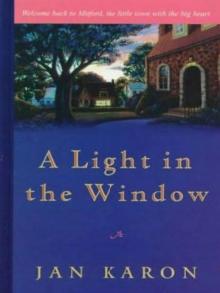 A Light in the Window
A Light in the Window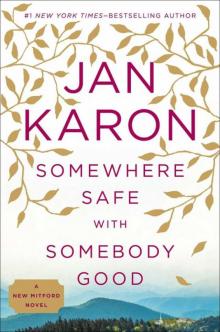 Somewhere Safe With Somebody Good
Somewhere Safe With Somebody Good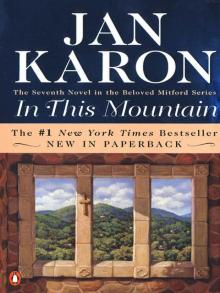 In This Mountain
In This Mountain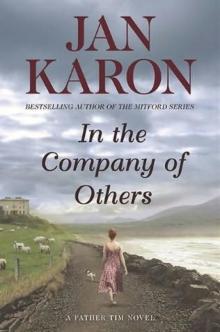 In the Company of Others
In the Company of Others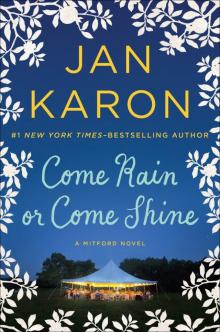 Come Rain or Come Shine
Come Rain or Come Shine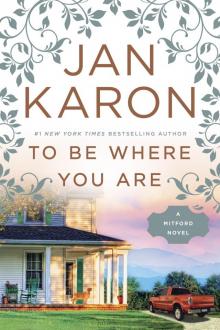 To Be Where You Are
To Be Where You Are These High, Green Hills
These High, Green Hills Light From Heaven
Light From Heaven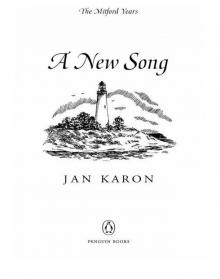 A New Song
A New Song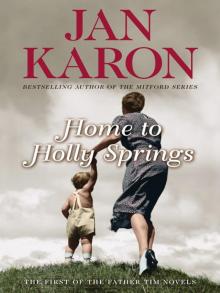 Home to Holly Springs
Home to Holly Springs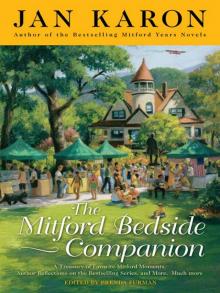 The Mitford Bedside Companion
The Mitford Bedside Companion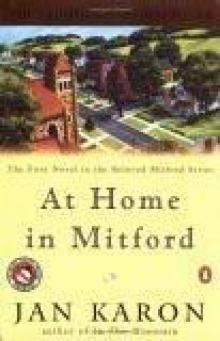 At Home in Mitford
At Home in Mitford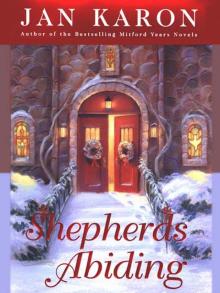 Shepherds Abiding
Shepherds Abiding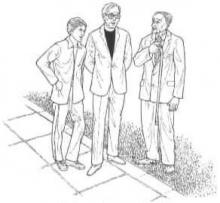 Out to Canaan
Out to Canaan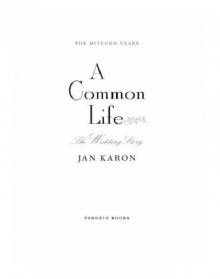 A Common Life: The Wedding Story
A Common Life: The Wedding Story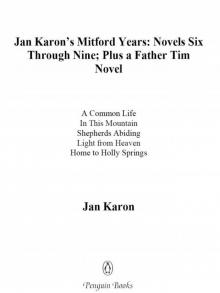 Jan Karon's Mitford Years
Jan Karon's Mitford Years